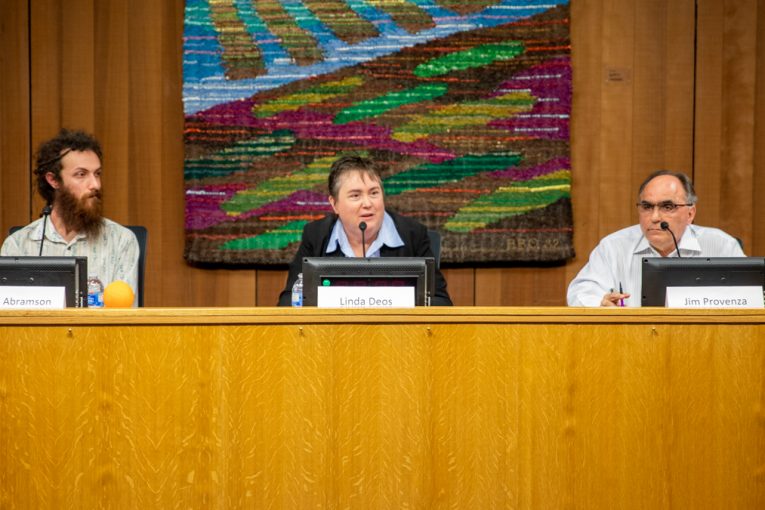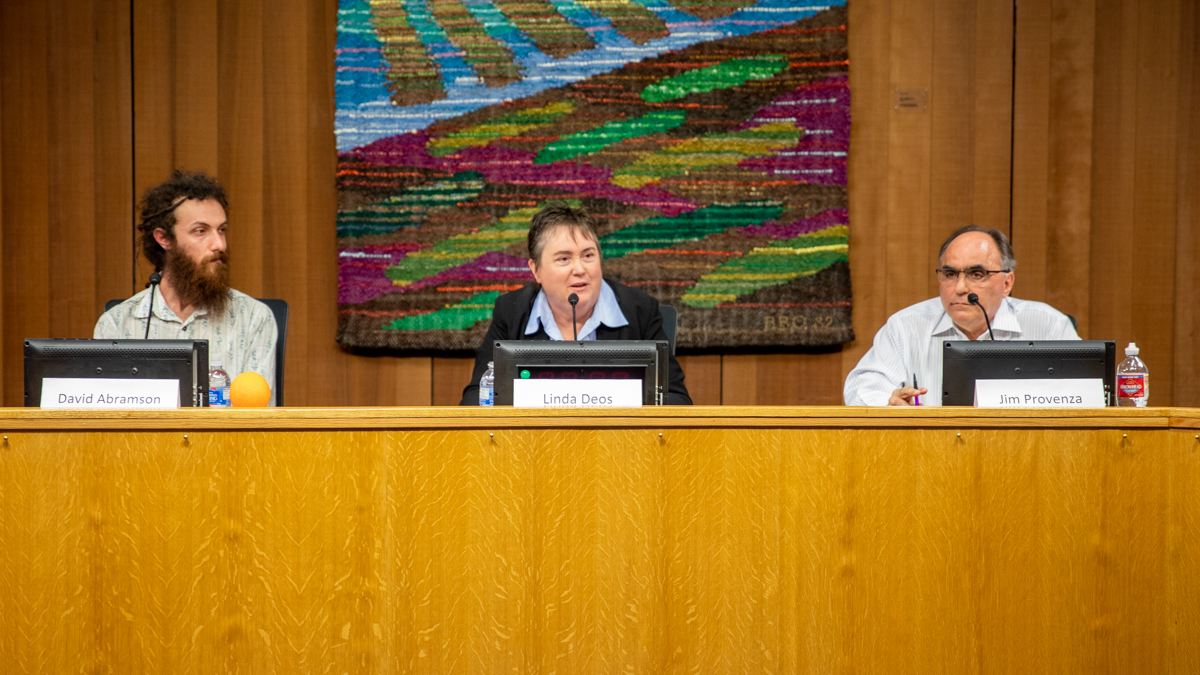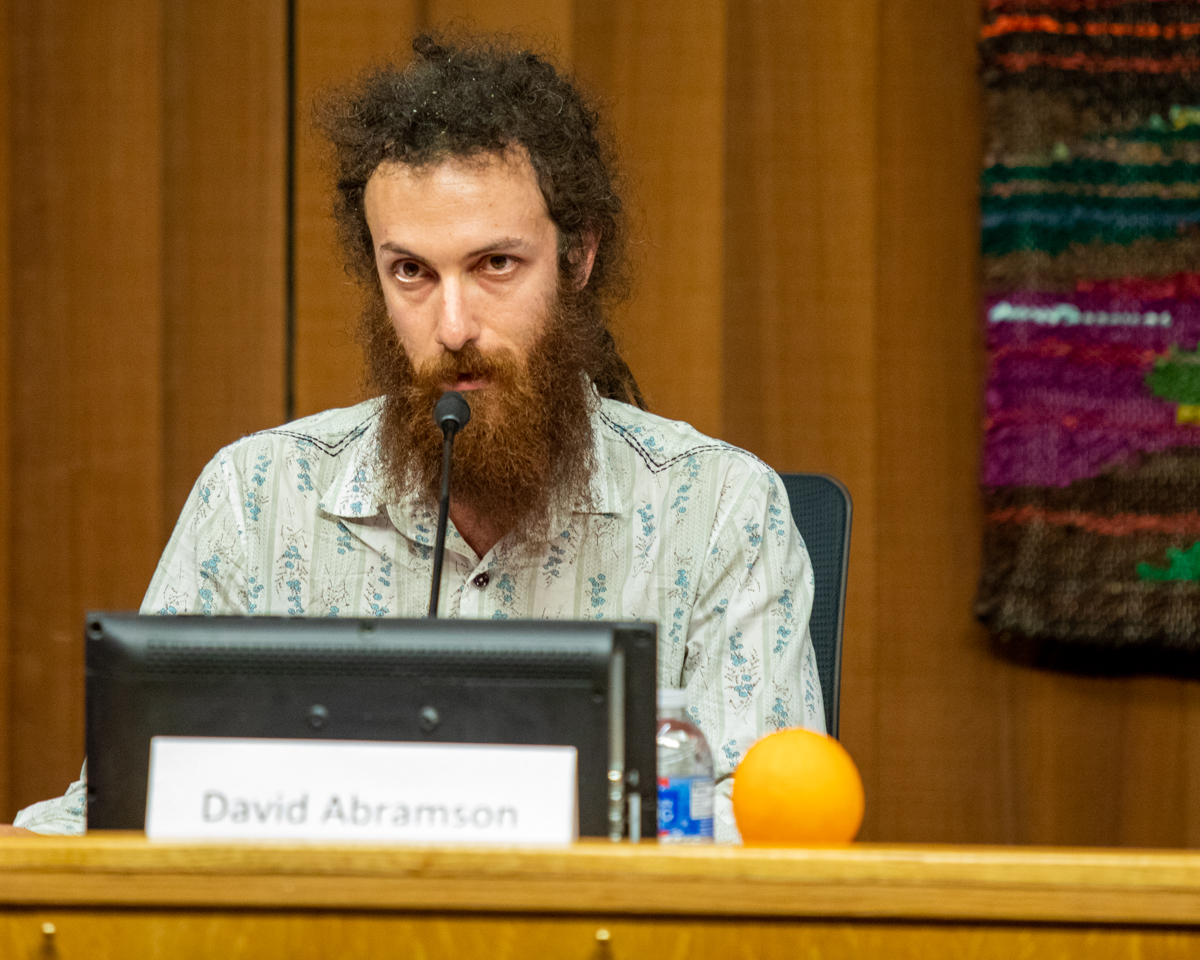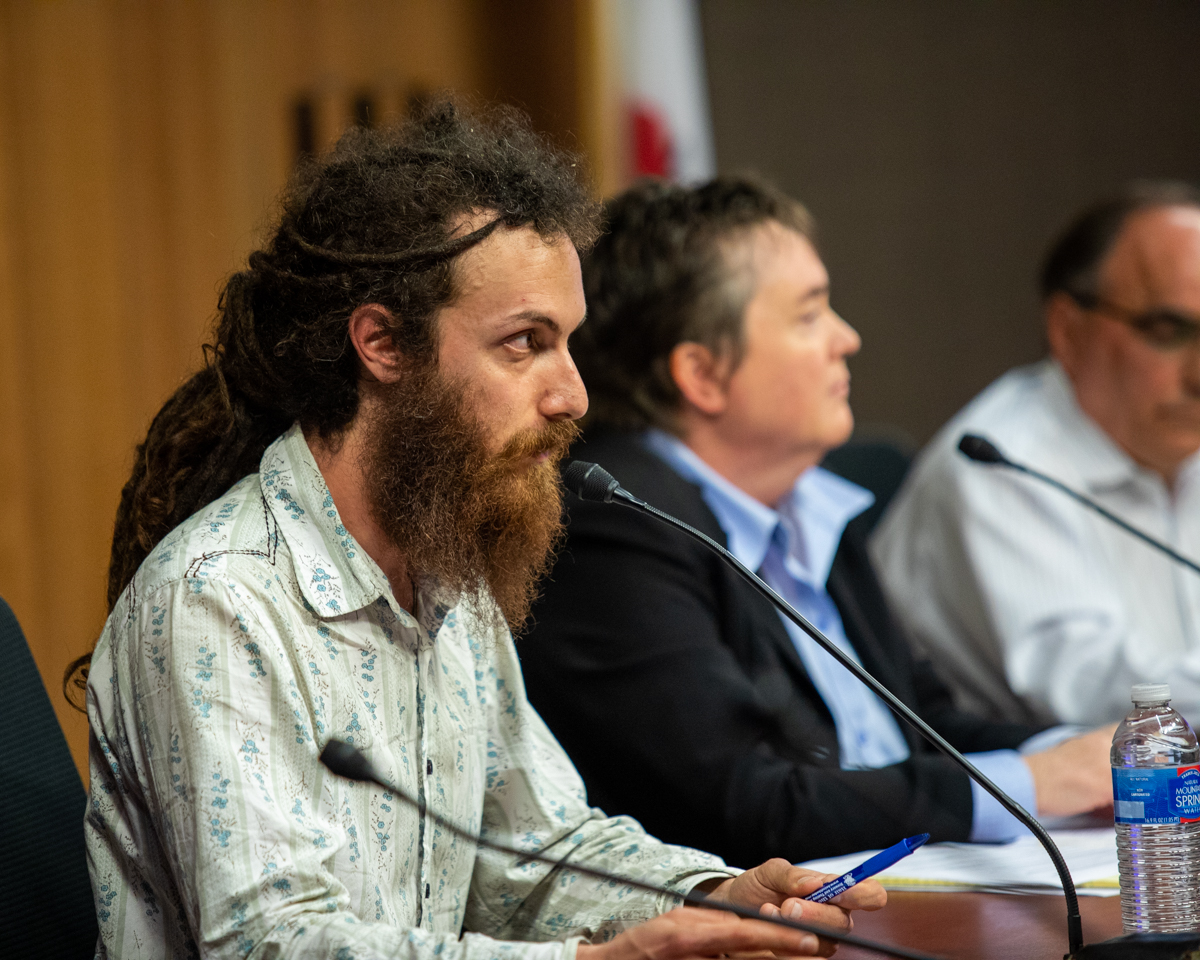

This is part of two of the League of Women Voters forum on the 4th District County Supervisor race, featuring incumbent Jim Provenza and two challengers – Linda Deos and David Abramson. They met on Sunday at the Community Chambers. The forum was moderated by Michelle Famula, retired head of student health services at UC Davis.
Question 4 – If elected, what specific actions would you urge the Board of Supervisors to take that promote criminal justice reform while balancing the need to protect public safety – for example should Yolo County continue to detain youth at juvenile hall or look at alternative solutions to youth misbehavior like improved mental health services?

Jim Provenza: The answer is that we are already doing those things and we should do more. We already have focused on mental health, in fact, I’m on a task force that is implementing a national stepping up program to identify ways to take people out of the criminal justice system – at arrest, after arrest, in jail, at all stages of the system. We have a road map for accomplishing that over the next few years.
The first thing was we recommended funding an additional mental health court. The mental health court’s fantastic because it takes people with a mental condition – they deliver services, it’s like a family meeting, they come together and they talk about the progress that’s made, what the person has been able to accomplish, and then they graduate from that and they go out without a criminal record and go on to successful lives in most cases.
– they deliver services, it’s like a family meeting, they come together and they talk about the progress that’s made, what the person has been able to accomplish, and then they graduate from that and they go out without a criminal record and go on to successful lives in most cases.
Also the drug interdiction court has a very similar role for people addicted to drugs. One of the things was an ORR release – not the refugee program but the own recognizance release program. And the own recognizance release program allow the person to be released from jail while they’re awaiting trial without having to put up bail.
What they do is study the risk factors – if someone’s risky to commit another serious crime, or too violent, they won’t be let out, but if the risk factor’s are such they’re likely to show up, and likely not to be a danger to the community, we release them. San Francisco just announced their doing that now – we started several years ago.
I would like to see us continue to develop this kind of program in the future.

David Abramson: Criminal justice reform is a very important issue that I really care about. I actually worked on Dean Johansson’s campaign in 2018. I was really inspired by the message that he was putting out and of all these progressive DA’s that are running on criminal justice reform.
I think for one – we’ve been criminalizing houselessness for so long. It’s so costly and inhumane and these people have nowhere to go. I think investing in our communities again, like I started saying is huge and it ends up being less costly to build housing for homeless people than it does to criminalize it.
I think really promoting helpful communities. I have a friend, Alfred Melbourne, who spent much of his adult life in prison, then he started this program in West Sacramento called Three Sisters Gardens to help engage youth, that were at risk of joining gangs – I just thought that was amazing. We really need to start funding these things and get to the root issues of crime. Otherwise we’ll just be constantly fighting the symptoms.
As San Francisco just did, we need to eliminate cash bail. I have this quote here from the Nation: “The crisis of mass incarceration in this country is fueled by cash bail. 95% of the growth in the jail population between 2014 was due to pretrial detention…”

Linda Deos: I have been campaigning to end cash bail for years. I’ve been writing to my legislature. I’ve been talking to anyone I can on this issue. That’s one reason I know that Dean Johansson has endorsed me in this race because of that strong stand I have with regard to cash bail.
I see it as a bankruptcy attorney, all the people coming to me and not being able to make ends meet and being one paycheck away from homelessness. And being one paycheck away because they can’t make their medical bills.
We have to do more – I appreciate the programs that the county’s been doing. I think they’re a great place to start from, but we still have problems when we’ve had recent youth shootings just happening in the last two weeks. Youth coming down here to Davis, stealing cars to go other places and commit crimes. There’s something off here. There’s something wrong. That’s why we need to build our collaborations with the other communities, with the county, to do something about this youth violence.
At the same time, we have a juvenile hall that right now has about ten people in it, but it houses 90 – is that the best use of our resources? Something else can be done with that facility. Something else can be done within the county. What we really must be focusing on – are adverse childhood experiences – ACES – and when we can focus on reduced childhood trauma, that’s going to lead going forward to less crime.

Question 5: What is your view of the 2 by 2 by 2 County-City-University process to discuss common issues and interests, especially with respect to farmland preservation, climate change, meeting UC Davis student housing needs, putting our region on the map as a leader in sustainable and equitable food?
David Abramson: This is what we need, especially when we start talking about these really complex issues like how are we going to address the climate crisis. Yolo County is amazing in that we have communities. We have urban centers. We have agricultural lands. We have the research institution. All these groups should be communicating and we really need to have a plan to all together address that.
We really need these interjurisdictional collaborations to address the climate crisis, and come up with solutions. The political system has really been lagging 30-plus years behind the researchers when it comes to addressing it. Now we’re kind of this last mile thing. Now everyone’s paying attention but now we really need open lines of communication.
I’m not a politician but I’m a researcher. I understand how to bridge the gaps between these areas. I really think int building a community collaboration, is the way to go across all sectors.

Linda Deos: I think it’s great that we have these two by twos. The city meets with the county. The county meets with the city. That we meet with the school districts. That we meet with UC. I agree we need to continue building upon that model of collaboration – but we need to have all the stakeholders at the table. All the time.
Issues with the delta for example – let’s have the farmers there, along with the duck enthusiasts, the duck hunters, the water fowl folk, the nonprofits, bring us all together to talk about it, not just one group over another group. Altogether at the same time. Let’s not play a blame game. Let’s not say we at the county can’t do it – that’s a city issue. No we can’t cross over – that’s a UC issue.
Let’s invite them to the table – instead of it’s not your fault, it is your fault. Let’s do more of – thank you, I hear you have concerns, come on over and let’s talk about them. Let’s see what we can do moving forward. It has to be about collaboration. I think we have to look at with respect to positive youth development – when we’re having issues of shootings here in the county, that’s a major issue. What are we going to do, how are we going to bring our communities together to address that issue. Along with the climate issues – it’s coming together and talking as a team.

Jim Provenza: The 2 by 2 by 2s – these are government agencies working together and it’s not the total answer. I agree we need to get everybody together like we have on the Delta Conservancy where we have farmers, we have citizen members, we have legislators – we have state-city people, we even have people who walk in off the street and we discuss those issues on a regular basis as to how to create sustainability for farming and habitat in our area.
One example of a successful 2 by 2 by 2 is the university, the city and the county. We were running up against a problem where the university was simply not building enough housing and that puts pressure on the Davis housing market because every time Davis builds more housing, more students come in and the university wasn’t keeping up. They were at about 29 percent, for a while, of the population when they should have been at 50 percent.
I brought a resolution to challenge their long-range development plan and this resulted in negotiations and the establishment of a 2 by 2 by 2 and as a result, we now have an enforceable agreement that the university will house 100 percent of its increased enrollment and that will do a tremendous amount to take the pressure off the Davis housing market so when we build in Davis, we can build for everyone else as well as the students.
—David M. Greenwald reporting

